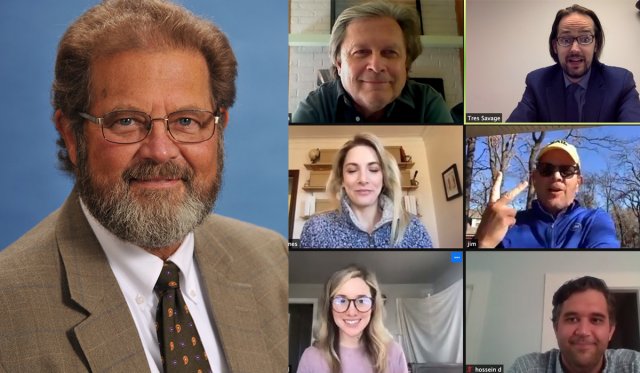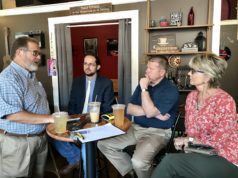

When Tres Savage asked me to consider joining NonDoc’s board of directors, I didn’t hesitate to accept.
NonDoc is part of a remarkable transformation of public affairs journalism in Oklahoma. Despite our state’s comparatively small population, we are home to a surprising number of successful nonprofit journalism operations. Besides NonDoc, the roster includes Oklahoma Watch, The Frontier and StateImpact Oklahoma.
It’s a far cry from the environment I encountered 43 years ago when I began covering the Oklahoma Legislature for the Oklahoma City Times, an afternoon newspaper.
In 1978, about 18 people worked in the State Capitol’s print media pressroom. Of those, 10 were employed by traditional, advertising-supported newspapers. Most of the others worked for wire services or legislation-tracking businesses. There were no print reporters working for foundation-funded or donation-supported nonprofits such as NonDoc in those days.
Today, about 13 people work in the Capitol’s print pressroom. Of those, only four are employed by traditional newspapers. Five reporters now work for Internet-based nonprofits that depend mainly on funds provided by charitable foundations, sponsors and individual donors. All of those were launched during the past decade.
The change reflects seismic shifts in the landscape of American journalism. For-profit news operations in general, and print-based newspapers in particular, have been clobbered by economic, cultural and technological changes. They include the proliferation of internet-based news outlets, the rise of social media, the flight of advertisers to other venues, big declines in paid subscribers, and, more recently, the economic sucker punch of COVID-19.
I was blessed to be able to work during a golden age of newspaper journalism. After the Oklahoma City Times, I worked for the Tulsa World, the Dallas Times Herald and the Los Angeles Times. I covered reporting beats ranging from city hall to the U.S. economy. I ran a business news section in Orange County, Calif., and edited investigative reporters in Washington, D.C.
I spent the final 16 years of my newspaper career in the L.A. Times Washington Bureau. As an assignment editor there, I supervised reporters covering the White House, Congress, the State Department and various domestic policy beats. My last gig was as a White House reporter during the presidency of George W. Bush.
Newspapers had much bigger news budgets in those days. I recall filing one expense report for nearly $50,000, which included the Times’ pro-rata share of a chartered press plane used to ferry reporters on presidential day trips. When I was sent to Iraq for several weeks in 2003 to help cover the aftermath of the U.S. invasion, I carried $10,000 in a concealed money belt so the Baghdad bureau could pay its office rent and assorted expenses.
At its peak in 2004, the Los Angeles Times had more than 1,100 editorial employees and a Washington Bureau staff of about 55. Today, the paper’s total editorial staff numbers about 525, less than half its previous total, and the Washington Bureau employs 30 people.
I moved back to Oklahoma in 2006 and began teaching journalism at the University of Oklahoma. Five years later, I started moonlighting for the newly launched Oklahoma Watch as a reporter, then served as executive editor for about a year. I continued to teach at OU and edit and report for Oklahoma Watch for several more years. I retired in 2018.
Journalism matters as much as ever
One of the students in the first class I taught at OU was Tres Savage. He was editor-in-chief of The Oklahoma Daily student newspaper, a position I had held exactly 30 years earlier. I was impressed by Tres’ intelligence, passion and imagination. (Regrettably, I had to give him an incomplete for not finishing his final assignment; he was spending too much time running The Daily. He had to turn in a substitute assignment after the semester ended so he could graduate.)
I’m still impressed by Tres’ energy and enthusiasm, his familiarity with the legislative process and state politics, his determination to treat all of its participants fairly and respectfully, and his commitment to the traditional values of high-quality journalism.
Those values remain as important as they ever were. I am increasingly convinced that the American form of democracy can’t function well without them. I believe many of us are yearning for the kind of impartiality that NonDoc strives to achieve.
I haven’t given up on traditional newspapers. I still subscribe to several. But I also contribute to NonDoc and other nonprofit news operations because they provide value-added content that can’t be found in legacy news operations alone. I encourage others to do the same.
I look forward to sharing the perspective of an old-school, ink-stained print reporter and editor with Tres and the rest of the NonDoc crew. While much has changed, some traditions are timeless.
Join Warren in supporting NonDoc today:
(Editor’s note: After Warren Vieth was elected to the board of the Sustainable Journalism Foundation during its Jan. 29 meeting, NonDoc editor in chief Tres Savage’s position on the board became ex officio and non-voting.)




















